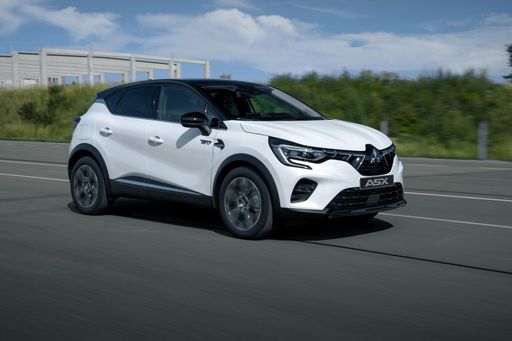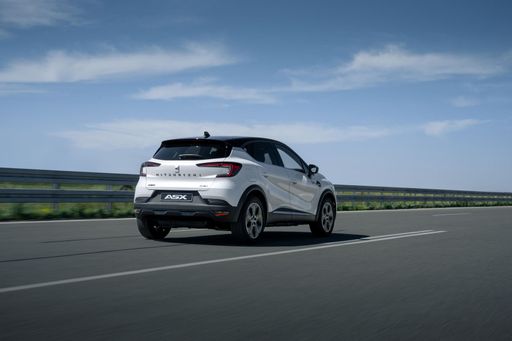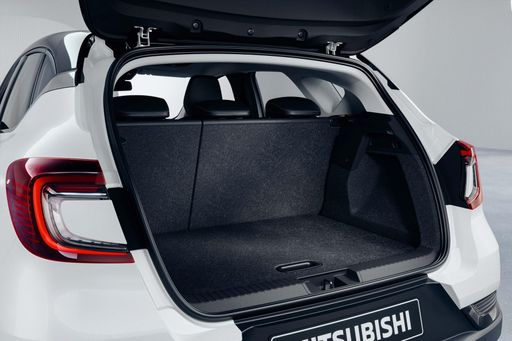Mitsubishi ASX vs SsangYong Torres - Differences and prices compared
Compare performance (158 HP vs 207 HP), boot space and price (20600 £ vs 33800 £) at a glance. Find out which car is the better choice for you – Mitsubishi ASX or SsangYong Torres?
Costs and Efficiency:
Looking at overall running costs, both models reveal some interesting differences in everyday economy.
Mitsubishi ASX has a convincingly advantage in terms of price – it starts at 20600 £, while the SsangYong Torres costs 33800 £. That’s a price difference of around 13286 £.
Fuel consumption also shows a difference: Mitsubishi ASX manages with 4.40 L and is therefore significantly more efficient than the SsangYong Torres with 7.90 L. The difference is about 3.50 L per 100 km.
Engine and Performance:
Power, torque and acceleration are the classic benchmarks for car enthusiasts – and here, some clear differences start to show.
When it comes to engine power, the SsangYong Torres has a distinct edge – offering 207 HP compared to 158 HP. That’s roughly 49 HP more horsepower.
In terms of top speed, the SsangYong Torres performs slight better – reaching 194 km/h, while the Mitsubishi ASX tops out at 180 km/h. The difference is around 14 km/h.
There’s also a difference in torque: SsangYong Torres pulls distinct stronger with 339 Nm compared to 270 Nm. That’s about 69 Nm difference.
Space and Everyday Use:
Beyond pure performance, interior space and usability matter most in daily life. This is where you see which car is more practical and versatile.
Both vehicles offer seating for 5 people.
In curb weight, Mitsubishi ASX is somewhat lighter – 1296 kg compared to 1498 kg. The difference is around 202 kg.
In terms of boot space, the SsangYong Torres offers evident more room – 703 L compared to 484 L. That’s a difference of about 219 L.
In maximum load capacity, the SsangYong Torres performs slight better – up to 1662 L, which is about 66 L more than the Mitsubishi ASX.
When it comes to payload, SsangYong Torres somewhat takes the win – 552 kg compared to 449 kg. That’s a difference of about 103 kg.
Who comes out on top?
Overall, the SsangYong Torres shows itself to be performs better in key areas and secures the title of DriveDuel Champion.
It convinces with the more balanced overall package and proves to be the more versatile choice for everyday use.

SsangYong Torres
Costs and Consumption
View detailed analysis
Engine and Performance
View detailed analysis
Dimensions and Body
View detailed analysis
Mitsubishi ASX
The Mitsubishi ASX is a compact crossover that mixes practicality with a no-nonsense personality, making it an easy choice for buyers who want sensible space without the showroom theatrics. It won't set your pulse racing, but its composed ride and user-friendly kit make it a dependable companion for daily errands and weekend escapes — reliable rather than flashy.
details



SsangYong Torres
SsangYong Torres cuts a rugged, purposeful silhouette that feels more expensive than its price tag, offering generously practical packaging and a no-nonsense feature set. It drives with surprisingly assured manners and genuine off-road appetite, making it a clever choice for buyers who want real SUV capability without badge snobbery.
details

|
|
|
|
|
Costs and Consumption |
|
|---|---|
|
Price
20600 - 32500 £
|
Price
33800 - 44600 £
|
|
Consumption L/100km
4.4 - 6 L
|
Consumption L/100km
7.9 - 9.1 L
|
|
Consumption kWh/100km
-
|
Consumption kWh/100km
18.70 kWh
|
|
Electric Range
-
|
Electric Range
462 km
|
|
Battery Capacity
-
|
Battery Capacity
-
|
|
co2
99 - 135 g/km
|
co2
0 - 207 g/km
|
|
Fuel tank capacity
48 L
|
Fuel tank capacity
50 L
|
Dimensions and Body |
|
|---|---|
|
Body Type
SUV
|
Body Type
SUV
|
|
Seats
5
|
Seats
5
|
|
Doors
5
|
Doors
5
|
|
Curb weight
1296 - 1493 kg
|
Curb weight
1498 - 1618 kg
|
|
Trunk capacity
348 - 484 L
|
Trunk capacity
703 L
|
|
Length
4239 mm
|
Length
4700 mm
|
|
Width
1797 mm
|
Width
1890 mm
|
|
Height
1575 mm
|
Height
1710 mm
|
|
Max trunk capacity
1458 - 1596 L
|
Max trunk capacity
1662 L
|
|
Payload
397 - 449 kg
|
Payload
552 kg
|
Engine and Performance |
|
|---|---|
|
Engine Type
Petrol, Petrol MHEV, Full Hybrid
|
Engine Type
Petrol, Electric
|
|
Transmission
Manuel, Automatic
|
Transmission
Manuel, Automatic
|
|
Transmission Detail
Manual Gearbox, Dual-Clutch Automatic, Automatic Gearbox
|
Transmission Detail
Manual Gearbox, Automatic Gearbox, Reduction Gearbox
|
|
Drive Type
Front-Wheel Drive
|
Drive Type
Front-Wheel Drive, All-Wheel Drive
|
|
Power HP
91 - 158 HP
|
Power HP
163 - 207 HP
|
|
Acceleration 0-100km/h
8.5 - 14 s
|
Acceleration 0-100km/h
-
|
|
Max Speed
168 - 180 km/h
|
Max Speed
191 - 194 km/h
|
|
Torque
160 - 270 Nm
|
Torque
280 - 339 Nm
|
|
Number of Cylinders
3 - 4
|
Number of Cylinders
4
|
|
Power kW
67 - 116 kW
|
Power kW
120 - 152 kW
|
|
Engine capacity
999 - 1789 cm3
|
Engine capacity
1497 cm3
|
General |
|
|---|---|
|
Model Year
2024 - 2025
|
Model Year
2023 - 2024
|
|
CO2 Efficiency Class
D, C
|
CO2 Efficiency Class
G, A
|
|
Brand
Mitsubishi
|
Brand
SsangYong
|
What drive types are available for the Mitsubishi ASX?
Available configurations include Front-Wheel Drive.
The prices and data displayed are estimates based on German list prices and may vary by country. This information is not legally binding.




